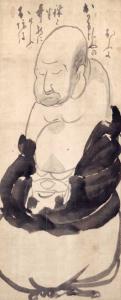Of late I’ve been caught up with questions of Zen practice.
As I see it first and foremost Zen is about awakening. Now, this is also important to say. Neither Zen nor Buddhism own awakening. Awakening is our common human inheritance. Although Zen’s practices of zazen, koans, and retreat are the unique disciplines of the Zen way, a great gift to the world.
Everything else about Zen is secondary. Not without importance. But secondary.
That said probably the most important of the secondary things are spiritual directors. An authentic Zen spiritual director is someone who has practiced the way for many years and who others begin naturally to gravitate toward. This is not ultimately a matter of official titles.
Of course, it is very hard for someone who has not had a teacher to themselves teach. And so the Zen way does foster teachers, and with that a tradition of acknowledgement that passes back into the mists of time.
Now, Dharma transmission can be abused, and is. So, in the West we find people who long for the titles. And so, as it is sometimes said, we have snakes and dragons mixed up together. But when Dharma transmission is simply understood as a human thing, the acknowledgment of someone who has given their life to the way that someone who has studied with them has also given their life to the way, then it becomes useful.
Zen has three styles of practice. The base line is lay practice. It is taking the gifts of the way and integrating them into a lived life along with work and family. The foundation is regular zazen, and hopefully an occasional retreat. Attending to the precepts and having a spiritual director round out this way. And this is important. Just these things are all one needs.
And, there is Zen as a monastic discipline. This is part of our common heritage, and historically is the principal way Zen is most deeply encountered. In the West this style of practice is associated with the Zen schools that form out of China, Korea, and Vietnam. The renunciant life is a mystery that calls a small number of us. And, it has traditionally also been the principal carrier of the tradition, and from where nearly all teachers come.
And, there is a third practice, principally developed within Japanese Zen, although there is also a Korean version. Terminology for this practice that is neither monastic nor lay has been illusive, although in the West it is increasingly called priestly practice. It includes a deeper attention to the life of vow in ways similar to the monastic discipline, although it does not include an expectation of celibacy. And it includes a commitment to a liturgical life. And, in the West it has supplanted monasticism as the seedbed for Zen teachers. Here it is also increasingly looking like Western ideas of ministry.
But each of these ways, lay, monastic, and priestly are about the primary call, to our awakening. And, each might produce teachers. But, again, awakening is what Zen is all about. It is our common call.
The joy of this Zen way is that it truly is open to all of us. It doesn’t matter what our lives look like, whether we are single or married, whether we have a job or not, whether we have children or not. Whatever our condition, we’re invited into the great way. As we are. As we are. And our hearts can take us in any of these differing manifestations of the Zen way.
This Zen way is simplicity itself. Sit down, shut up, pay attention. And, if you possibly can, checking in with a spiritual director. Maybe a retreat as one can. With these things one is authentically walking the Zen way. The rest is the matter of heart and karma.













